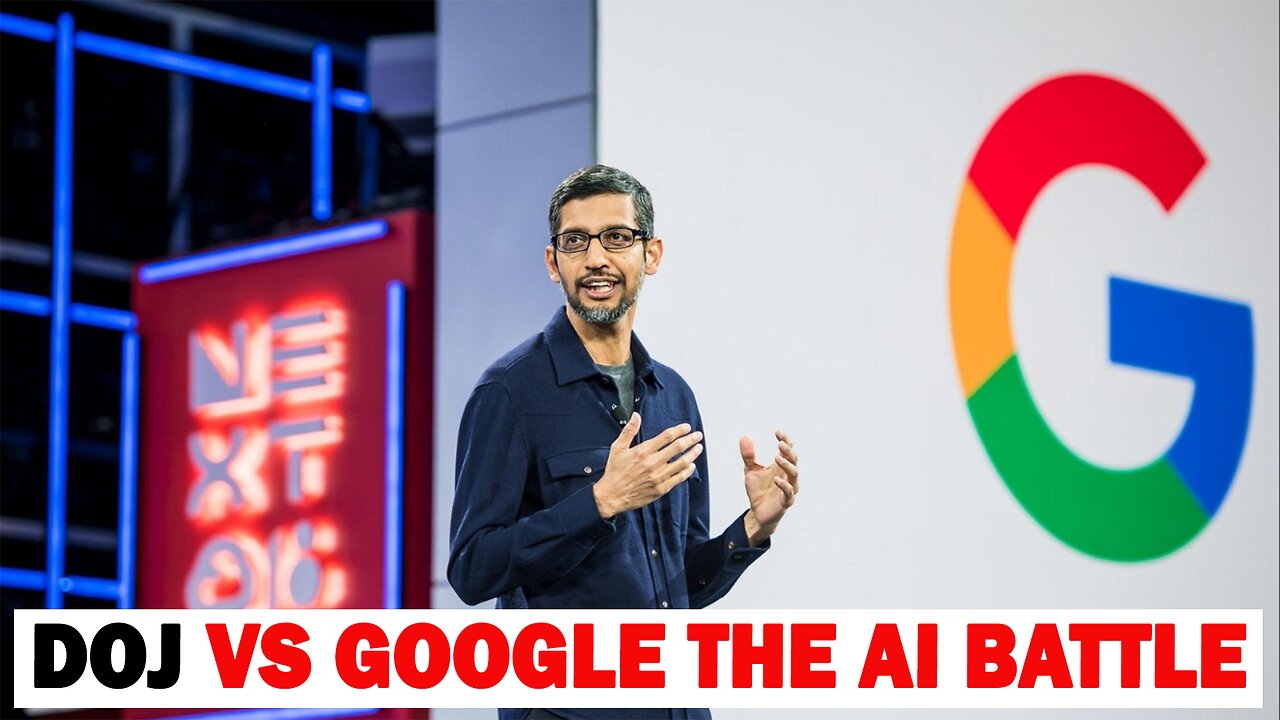Premium Only Content

How Google’s AI Power Grab Could Change Everything | DOJ Antitrust Trial Explained | newsdrift
Is Google using its dominance in search to control the future of AI? In this video, we break down the U.S. Department of Justice’s ongoing antitrust trial against Google and explore how the case could reshape the tech industry. From exclusive search deals to AI platforms like Gemini, learn how Google’s massive data advantage is at the center of the government's argument—and what bold remedies like breaking up Chrome or ending default agreements could mean for the future of the internet.
🔍 Topics Covered:
Google search monopoly and DOJ ruling
Google’s Gemini AI and data advantage
Exclusive deals with Apple and Samsung
Proposed remedies: Chrome divestiture, data sharing
Sundar Pichai's response to DOJ
What this means for the future of AI and big tech
📅 Stay updated as the court decision approaches in August 2025.
#Google #Antitrust #AI #GeminiAI #TechNews #DOJvsGoogle #BigTech #ArtificialIntelligence #Monopoly #DigitalPrivacy #FutureOfAI
CNN, Fox News, MSNBC, ABC News, NBC News, CBS News, PBS NewsHour, Bloomberg News, CNBC, The New York Times, The Washington Post, NewsNation, Reuters, Associated Press, USA Today
In a courtroom in Washington, D.C., the U.S. Department of Justice is taking on one of the most powerful tech companies in the world—Google. At the center of this high-stakes battle is a question that could shape the future of the internet and artificial intelligence: Is Google using its dominance in search to unfairly control the next frontier—AI?
The DOJ’s case against Google originally began over its control of the search engine market. In August 2024, a federal judge ruled that Google had illegally maintained a monopoly in general search services and text advertising. Now, the trial has entered a new phase focused on remedies—what should be done to restore competition.
But the focus isn’t just on search anymore. It’s on artificial intelligence.
The government argues that Google’s position in search gives it an unbeatable edge in AI. By dominating how users search the web, Google collects massive amounts of data—data that fuels its AI models, including its Gemini AI platform. This cycle, they argue, reinforces Google’s power. More data makes better AI. Better AI brings in more users. And more users generate even more data.
According to the DOJ, this is more than just smart business. It’s a self-perpetuating monopoly. And it’s not just about data. Google is striking deals to expand its AI reach. The DOJ pointed out that Google has paid companies like Samsung to pre-install the Gemini AI app on Android devices. These kinds of arrangements echo the very practices that landed Google in court in the first place—paying to be the default.
To counter this, the DOJ has proposed bold solutions. One is the divestiture of Chrome—yes, forcing Google to sell its Chrome browser. The idea is that by owning the browser, Google controls how billions of people access the web. That control gives it another unfair advantage in shaping the AI experience.
Another proposal is to ban Google from making exclusive agreements that lock in its dominance. One example is the staggering \$26.3 billion deal Google has with Apple to be the default search engine in Safari. The DOJ wants to end these kinds of arrangements.
The most radical proposal? Requiring Google to share some of its data with competitors. The government believes this would level the playing field in AI development. It would give smaller companies access to the kind of data they could never collect on their own.
These ideas aren’t without precedent. The DOJ has drawn comparisons to major antitrust cases in the past—like the breakup of AT\&T in the 1980s or Standard Oil in the
Google also points out that its investments in AI benefit consumers and keep the company competitive against emerging rivals. In fact, Google faces growing pressure from companies like OpenAI and Microsoft, both of which have gained ground with powerful AI tools like ChatGPT and Copilot. From Google’s perspective, the market is evolving rapidly, and its AI dominance is far from guaranteed.
So what happens next? The judge is expected to rule on the proposed remedies by August 2025. If the DOJ gets its way, the consequences could be massive—not just for Google, but for the entire tech industry. Forcing Google to split off Chrome, end default agreements, or share its data would dramatically reshape the competitive landscape. It could open the door for new players in AI and search. Or it could create new legal and technical headaches that disrupt how billions of people use the internet.
At its core, this case is about more than one company. It’s about the future of how we find information, how AI is built and deployed, and who controls the digital tools that are becoming essential to our daily lives.
Whether you see Google as a visionary innovator or a modern-day monopoly, one thing is clear—the outcome of this case could change the tech world forever.
-
 LIVE
LIVE
The Rubin Report
1 hour agoListen to ‘The View’ Crowd Gasp as Whoopi Admits She Agrees w/ Conservatives on This
3,201 watching -
 LIVE
LIVE
LFA TV
12 hours agoBREAKING NEWS ON LFA TV! | FRIDAY 9/19/25
4,360 watching -
 1:00:49
1:00:49
VINCE
2 hours agoTrump Is Finding The Missing Children | Episode 129 - 09/19/25
180K72 -
 LIVE
LIVE
Nikko Ortiz
1 hour agoBeing Poor Is A Choice?! - Rumble Studio LIVE
224 watching -
 LIVE
LIVE
Caleb Hammer
2 hours ago$60,000+ For New Boobs | Financial Audit
244 watching -
 LIVE
LIVE
The Big Mig™
3 hours agoRet. Col. Doug Macgregor, Battlefield Legend & Author
3,829 watching -
 1:45:19
1:45:19
Dear America
3 hours agoErica Kirk Just Announced As Turning Point CEO!! + Senate Dubs Oct 14th Charlie Kirk Day!!
130K26 -
 LIVE
LIVE
Benny Johnson
2 hours agoStephen Colbert DOUBLES DOWN On Jimmy Kimmel's Lies | Inside Decision to RIP Jimmy Kimmel Off Air...
6,257 watching -
 LIVE
LIVE
Badlands Media
7 hours agoBadlands Daily: September 19, 2025
3,881 watching -
 35:08
35:08
Colion Noir
20 hours agoA Bear, an AR-15, and a Home Invasion
69.9K10